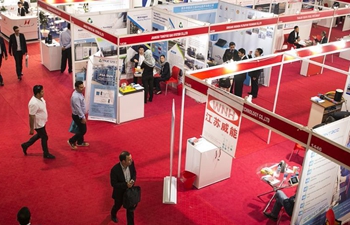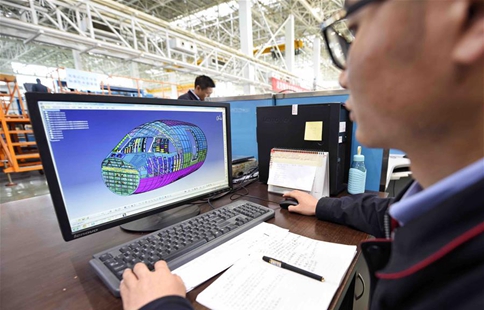
File photo: The Chinese and American flags are being raised at the Chinese Civic Center in Houston, the United States, on Sept. 25, 2011. (Xinhua/Song Qiong)
BEIJING, May 7 (Xinhua) -- Economic complementarity has led to win-win results in Sino-U.S. bilateral ties, said a joint report from the China Finance 40 Forum (CF40) and Peterson Institute for International Economics (PIIE), a leading U.S. think tank.
Structural complementarity is the key behind the growing bilateral trade relations, as China has comparative advantages in labor-intensive industries and the United States has comparative advantages in capital-intensive industries and high-yield agriculture, according to the report released Sunday in Beijing.
"As the U.S. largest import origin, China contributed 46 percent of U.S. total deficit in trade of goods in 2016... but China is in a state of economic rebalancing," PIIE President Adam Posen said at the 6th CF40-PIIE Economists Symposium of officials and scholars in Beijing.
"Improved Chinese domestic investment and consumption structure will help reduce the bilateral trade imbalances. By the same token, increased U.S. fiscal deficits and their potential effect on U.S. dollar valuation would widen U.S. overall and bilateral trade deficits," Posen said at the symposium for the launch of the report.
The new U.S. government is concerned about the bilateral deficit, but a Sino-U.S. trade war would be a lose-lose scenario, said Guan Tao, a senior fellow at the CF40.
"U.S. foreign direct investment (FDI) in China is growing rapidly and the return is relatively high. China's overseas direct investment (ODI) in the United States grew faster at 58 percent between 2004 and 2015," said Guan, a former senior official at the State Administration of Foreign Exchange.
A bilateral investment agreement would be helpful for the two countries, while speeding up structural reform and opening up the market is China's best strategy to avoid economic conflict with the United States, noted the report.
The Beijing-based CF40 is a top non-government and nonprofit think tank dedicated to policy research on economics and finance. The Washington-based PIIE is a private, nonpartisan and nonprofit institution renowned for international economic policy research.

















